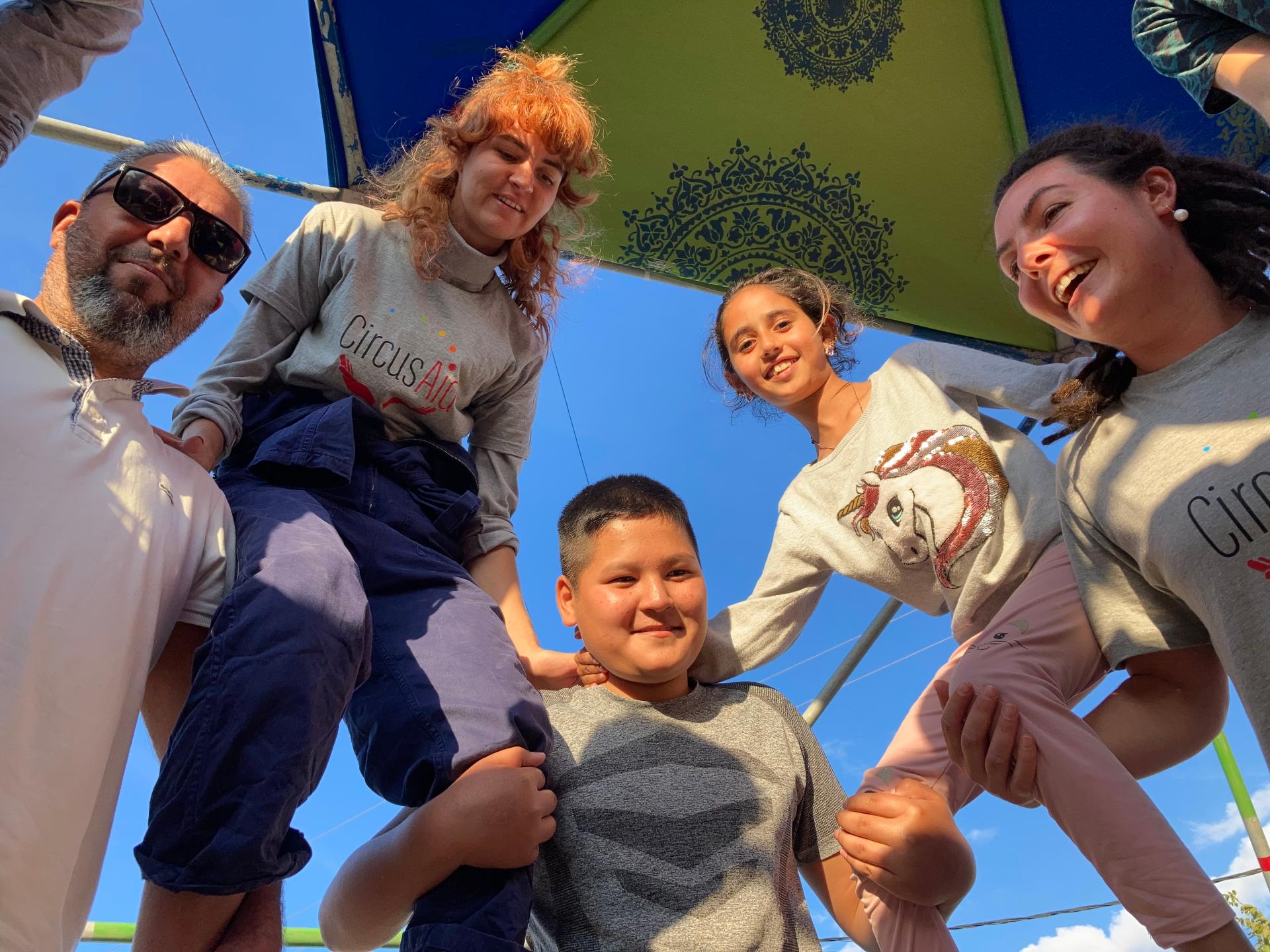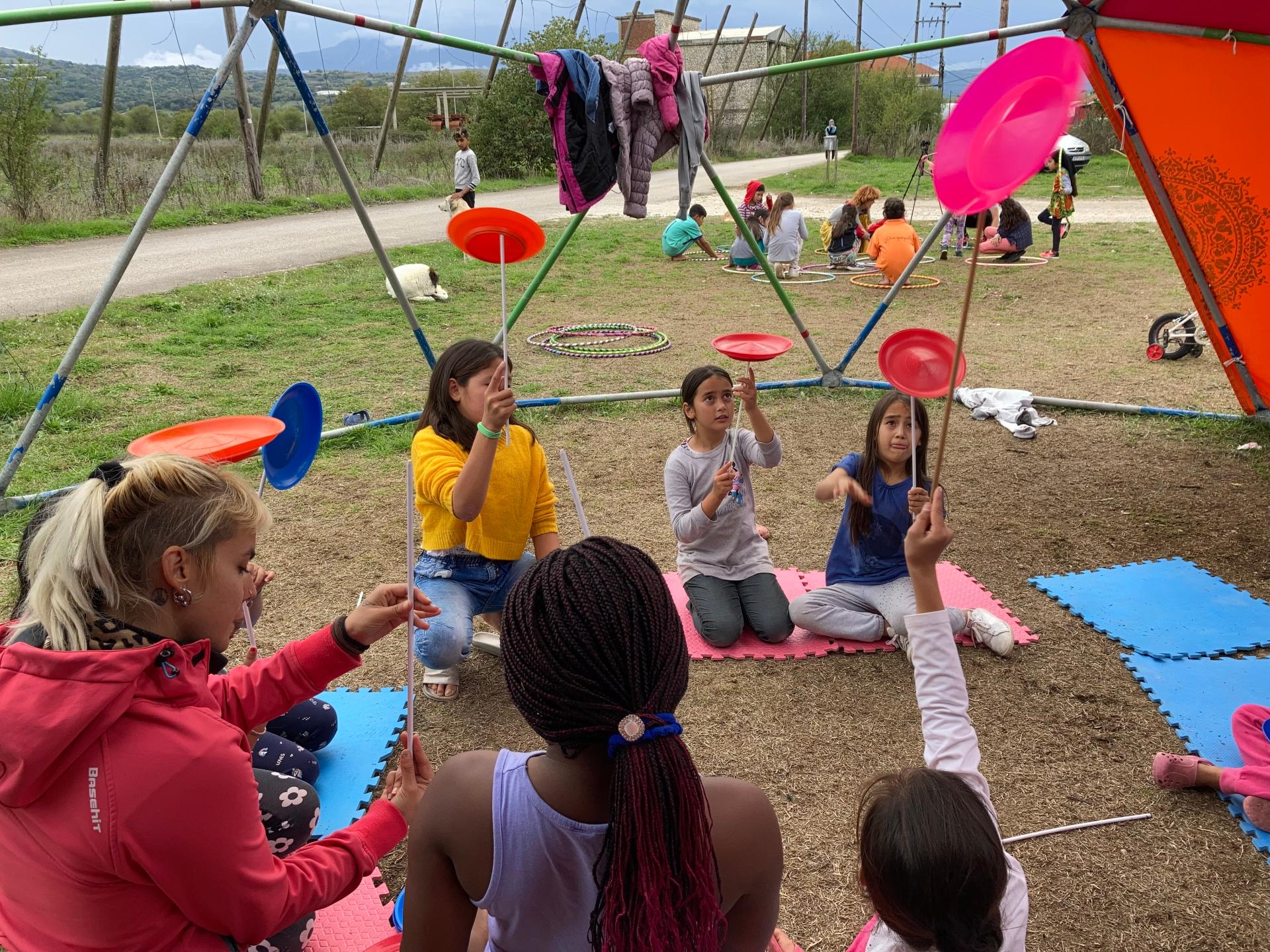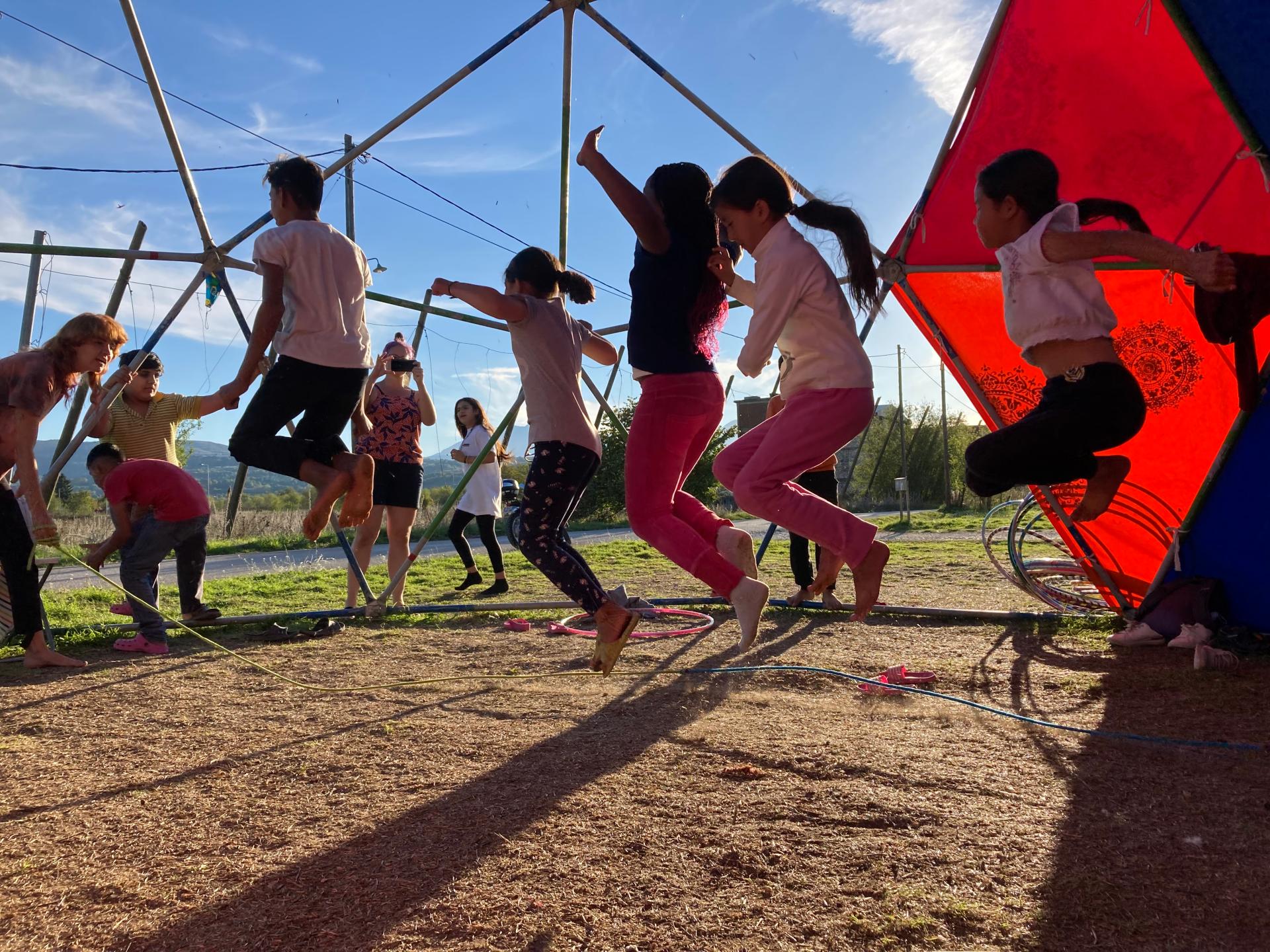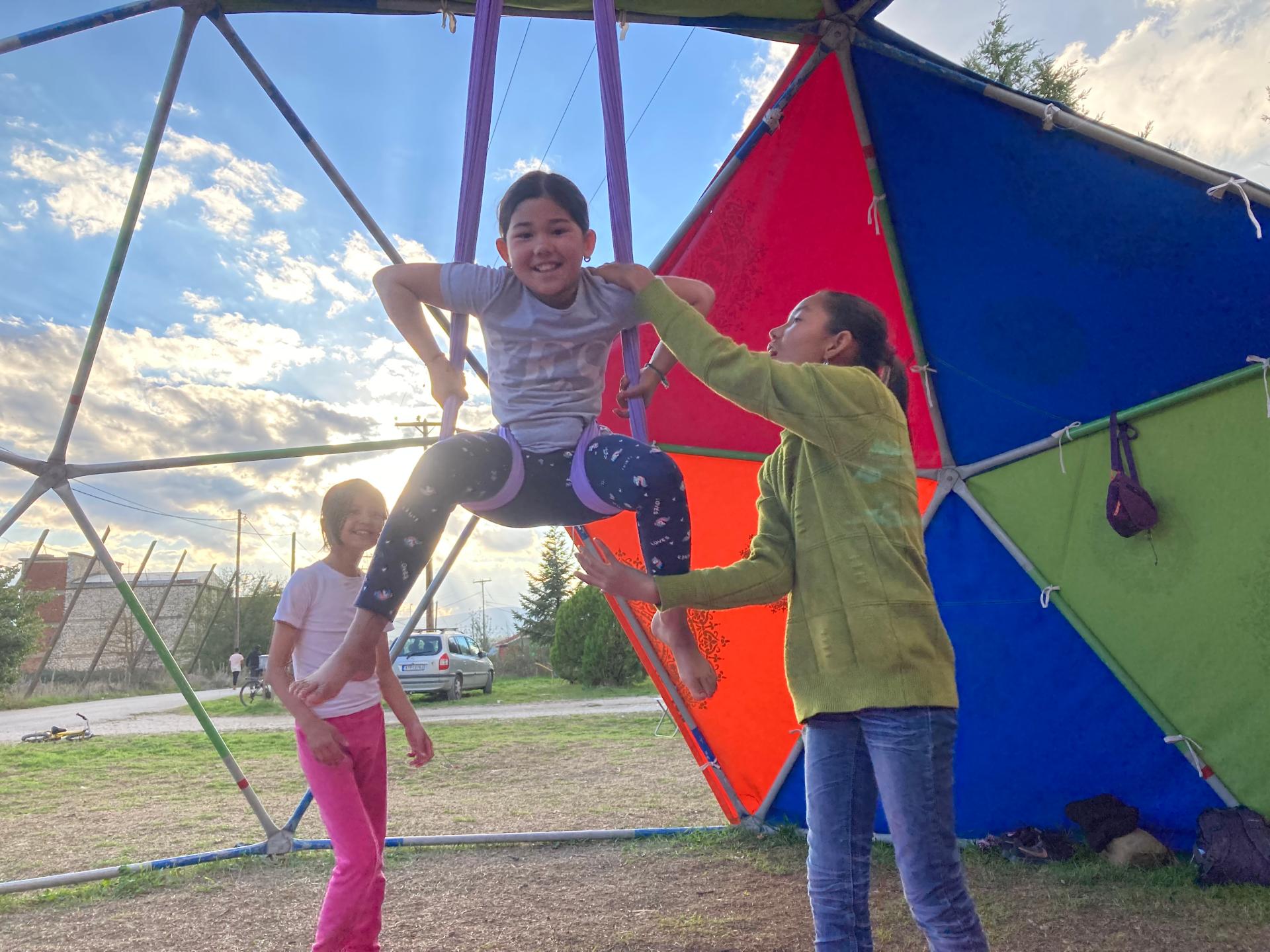CircusAid
Basic information
Project Title
Full project title
Category
Project Description
CircusAid programs build resilience, mental health, and community connection through engagement in circus activities delivered to increase social, emotional, physical, and cognitive capacities. The projects are implemented in partnership with local NGOs to help service recipients heal from trauma, feel a sense of belonging and connection to their community, and gain life skills to enable engagement in meaningful occupations.
Geographical Scope
Project Region
Urban or rural issues
Physical or other transformations
EU Programme or fund
Which funds
Description of the project
Summary
REGAINING A SENSE OF BELONGING FOR DISPLACED PERSONS
CircusAid provides free services to help people displaced by war and natural disasters attain transferable life skills to promote greater success in unstable physical and political environments.
CircusAid projects have a specific focus on the intersection of circus and occupational therapy for addressing the negative consequences of displacement, especially mental health issues and trauma as they relate to the experience of occupational deprivation for political and environmental refugees.
CircusAid programs build resilience, mental health, and community connection through engagement in circus activities delivered to increase social, emotional, physical, and cognitive capacities. The projects are implemented in partnership with local NGOs to help service recipients heal from trauma and gain life skills to enable occupational engagement during the resettlement process.
CircusAid and local acting agencies in Greece have common goals of restoring human dignity through diverse programming that teaches sustainable life skills such as trust, reciprocity, communication, teamwork, self-awareness, and self-confidence. These life skills are the basis of CircusAid programs that provide joyful experiences along with transferrable skills to support displaced persons and marginalized communities during various stages of their lives.
Since 2015, CircusAid has worked in Greece, France, and Indonesia, engaging over 5000 Afghan, Syrian,Iraqi, Sudanese Eritrean, Ethiopian, and Indonesian political and environmental refugees in social circus programs. Participants have reported increased levels of happiness, motivation, self-confidence, better sleep, and improved connections to their communities as a result of engagement in CircusAid programs.Our last project delivered services to the residents of the Katsika Refugee Camp in Ioannina and was completed October 31st 2021. We hope to continue with our projects in 2022
Key objectives for sustainability
At CircusAid, we perceive sustainability as the promotion, continuation and evolution of life skills and the community health benefits we promote using circus as an educational and therapeutic medium. We are impact-focused. We assess sustainability based on the continuation and the development of the physical, cognitive, social and emotional health benefits our activities result in. Our understanding of sustainability is focused on the long-term health and wellbeing of the communities we serve over and above our own practices. This is what we consider to be impact-focused, sustainable and, with that, exemplary about CircusAid.
Please see these links for more information:
Our Lombok branch of CircusAid-trained facilitators has continued to provide ongoing CircusAid workshops and community projects since they completed the training in February 2020. Our Greek-based project as Katsika camp has resulted in our locally trained staff continuing circus classes within their communities. Because of their success, ownership and continued actions, if awarded this funding we plan to continue implementing the same train the trainer program here in Greece for circus artists, occupational therapists, students, and other professionals who work with marginalized populations and in community development.
How Our Setup Practices Circularity
- We purchase raw and recycled materials from local producers to minimize the environmental impact of international transportation whilst supporting the local economies in which we run programs.
- When we do purchase specialized equipment from overseas, that decision is made based on the quality and long-lasting durability of the materials. The materials we purchase are meant to last and be reused over and over again.
- We leave no known negative environmental impacts or damages as our workshop space, the geodesic dome is constructed, deconstructed and moved as needed
Key objectives for aesthetics and quality
AESTHETICS:
The geodesic dome creates a special space in which the participants can feel an escape from their institutionalized environment and from the stress often associated with the uncertainty of their personal situations. Our aim is to provide joyful experiences through play in a self-built colourful dome that maintains a sense of magic. It also makes the participants feel that they are valued, that they deserve this special place that we bring to them, and that they are worthy of not just basic human rights, but also experiences of connection to others and creative expression. The geodesic dome enables the repurposing of refugee camp spaces towards positive intergenerational and interracial exchanges to build community wellbeing. The best way to see this is through the links provided below from some of our past projects:
**The video footage from our last Greek-based project in October 2021 attached**
How the Quality of the Experience Effectively Addresses Trauma
- Through physical activity, trauma stored in cellular memory, primarily in the muscle and fascia, can be released. Therefore, we engage in a variety of physical activities that involve various forms of movement, muscle control, flexibility, endurance and strength building.
- A mix of cognitive and physical activities are delivered so as to promote mindfulness, ‘flow’ states, and presence, resulting in more inner peace and improved capacities like self-awareness and planning; that may have been impacted by the detrimental effects of trauma on the pre-frontal cortex.
- Through the experience of play, traumatic memories are replaced with more joyous ones centred around resilience, community health and intrinsic motivation to create a sustainable impact.
Learn more about our activities here
Key objectives for inclusion
Key Objectives in terms of Inclusion: CircusAid projects advocate for inclusivity, accessibility, diversity and social connectedness. These characteristics are what define the culture of CircusAid and are simultaneously the aspects of wellbeing that the people we provide services for miss out on because of what makes them different from more mainstream or privileged members of society.
- We invite local citizens, including skilled professionals, students, volunteers and service recipients, to bring their own strengths in co-designing an effective project that meets the community wellness collective goals we all share. This also helps the local community to better understand the refugees and to feel compassion for their situation. The free circus workshops are inclusive of all ages, races, social statuses, gender and abilities.
- The professional development training we provide in social circus and occupational therapy evidence-based practices keep the quality and integrity of the project while building the personal and professional capacities of the people we train.
- We work in cooperation and collaboration with local organizations to provide an all accessible environment that comprehensively meets the social support needs of the people we work with.
- We are exemplary in that we are the only occupational therapy informed circus project in the European Union that provides education and professional development training for occupational therapists and circus artists while also providing free community health services to marginalized populations.
Results in relation to category
RESULTS: Workshop participants have reported increased levels of happiness, motivation, self-confidence, better sleep, and improved connections to their communities. Professional development training participants have reported increased capacities (100%), innovative work ideas (90%) and more employment opportunities (70%) as a result of participating in our projects. CircusAid has well-documented positive impacts on helping people restore their sense of self after they experience displacement from political and environmental disasters. Our organization uses assessment tools to measure impact and guide program growth.
From the voice of CircusAid participants: Thiva Refugee Camp, Athens, 2018
”Circus makes me happy.”
”It is beautiful.”
”The people that come here they love the children they take care of the children there is love here.”
”Fun. All the things (activities) are good and funny”
”It (circus) makes me feel strong and happy”
”(In circus) I learn to play. I thought I can’t play but I can play something."
"(I feel) happy, relaxed and tonight sleep very good”
”(I) feel relaxed after circus. I want to come back every time.”
SELF CONFIDENCE: 100% of participants felt their self-confidence had increased as a result of the
training.
COMMUNICATION: 90% of participants report their communication abilities have increased.
LEADERSHIP: 90% of participants said their leadership skills increased as a result of the program.
TEAMWORK: 100% of participants reported they had learned leadership and teamwork skills.
How Citizens benefit
CircusAid has collaborated with Universities and Non Governmental Organisations to co-create culturally relevant and inclusive community projects. In 2019, we partnered with the Metropolitan College of Athens. In 2020, we partnered with ZHAW university providing training to students and occupational therapists in the methodology we use and in preparation for their involvement in our 2020 project that was postponed until 2021 because of COVID. In 2021, circus artists and occupational therapists from Greece and Switzerland collaborated with Second Tree and Habibi Works to design and implement programs for the Katsika Refugee Camp residents. In 2022, we will partner with the Metropolitan College of Thessaloniki to provide a similar experience as in Athens in 2019.
Following training, participants are invited to participate in projects, including the planning of the daily activities, contributing to team building sessions, facilitating the circus activities to camp residents and daily reflection and evaluation meetings.
Since 2016, CircusAid has partnered with Solidarity Now, Project Elea, IOM, Lifting Hands International, Arsis, Habibi Works and Second Tree to conduct pre-project assessments and co-create relevant social circus and occupational therapy projects that reflect the needs of residents, citizens and asylum seekers. Our transdisciplinary approach includes working with these various NGO’s and stakeholders from the local community to support a participatory process involving relevant community members.
Our collaborators have reported benefits of increased team cohesion, increased communication, increased team morale and motivation. Some people have also reported learning theoretical and practical skills that they can apply in other contexts.
Including citizens from the local community has benefited CircusAid in being able to co-create culturally relevant and effective projects that are inclusive of different needs and perspectives.
Physical or other transformations
Innovative character
CircusAid is innovative in its application of occupational therapy and occupational science frameworks to community health contexts. We contribute to restoring the pride of marginalized communities and shaping community health to include diversity, art, and evidence-based therapeutic practices at local and regional levels in Greece. CircusAid is innovative in our social enterprise model that enables the funding of free services for those who can not afford them to be supported by funding of those who can afford them. In this way, more privileged and resourced members of society are directly or indirectly involved in supporting the health needs of underrepresented communities. STRATEGIC PLANNING: Our operational structure is one of the innovative characteristics of our projects. Most mainstream NGO’s have 5+ years of projected plans. We plan one year in advance to ensure we conduct relevant needs assessments that enable us to respond to the ever-changing, unstable political and residency situations of the populations we serve. If the majority of displaced persons and refugee communities do not know where they will be in 5 years, how can we logically plan an authentic service for them 5 years in advance? The current and changing situations of the people we work with guide our practices. CircusAid is guided by a “process over product” framework. This way of working with communities involves letting go of professional identities so community development becomes about something greater than ourselves. We are driven by the changing needs of the communities we collaborate with. Mainstream social service providers generally address basic living needs and health at an individual level, but neglect to focus on community health and resilience. CircusAid differs from mainstream social service providers by addressing community health and development, through which people gain a sense of belonging rooted in community.
Learning transferred to other parties
The CircusAid higher education fieldwork program and volunteer experience program was created to share the knowledge, skills and methodology we use with others wanting to either collaborate with us, continue the work we have started or work within similar contexts. We transfer our knowledge via online and in-person training, academic conferences, and community events. The training we provide is suitable for occupational therapists, social workers, students, educators, circus artists, mental health workers, special needs service providers, public health advocates, and anyone who works with people with learning differences, special needs or socio-political challenges. Participants obtain evidence-based theoretical and practical skills required to incorporate circus as a social, emotional, physical and cognitive capacity-building tool for individuals and communities. For details of our learning objectives and course curriculum, please see the linked document HCT Professional Development Training. Our next in-person training is scheduled for April 2nd, 2022 in Thessaloniki, Greece. Our online training is ongoing and can be followed here: WFOT link.Since 2016, we have been sharing our project results and learning at academic conferences in Europe and South Africa. Please see:
- Maglio, J. Bogeas, T. (2019) Occupational Therapy and Circus: An interactive workshop. 25th Annual ENOTHE Meeting. Athens, Greece. October 17th-19th.
- Maglio, J. McKinstry, C. Fortune, T (2018) How is circus being utilized by occupational therapists? WFOT Congress 2018. Cape Town, South Africa. May 21st-25th.
- Maglio, J. (2016) CircusAid: Circus in the Calais Jungle 2016. Conference on the Future of Circus Arts in the European Union, European Parliament, October 18th. (online)
- Maglio, J (2016) How can circus and occupational science be used as a tool to create a more peaceful existence among displaced people in the context of the refugee crisis? Build Peace Conference. Zurich, Switzerland Septem





